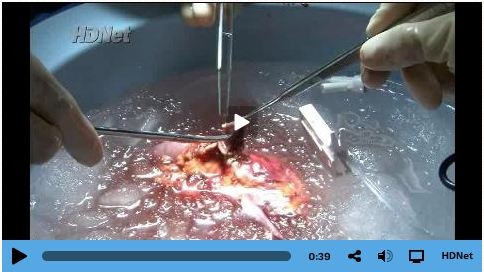Tomorrow night (Oct 26) at 9 PM EDT, HDNet World Report will air an episode entitled Chain of Cures: A Revolution in Kidney Transplants. HDNet has a reach of 5 million households in the U.S. But if you don’t get HDNet, you can download this show from iTunes a few days after it airs. The show, hosted by Dan Rather will report how kidney exchanges can benefit patients who are in need of a kidney transplant.
Chain of Cures. Video still from HDNet
The show will feature the work being done by the National Kidney Registry to allow transplant centers to match kidney recipients with a compatible donor. It will describe how the matching algorithm facilitated a chain of transplants that included 21 recipients and described in a Sep 2010 blog post.
The story also features the story of a kidney transplant recipient, Melissa Clynes. Melissa was a patient at Loyola University Medical Center in Chicago. Her story was featured in an Apr 2010 blog post.
Harvey Mysel of the Living Kidney Donors Network provides some more details about Melissa’s story.
“Melissa, now 18 had a heart transplant when she was 10 days old. When she was 13, Melissa needed a kidney transplant and her mother, Mary, was her donor. Five years later, one year ago, Melissa’s kidney was failing and she needed another kidney transplant. As a result of the previous 2 transplants, Melissa was highly sensitized. Melissa’s sister, Sarah wanted to donate, but was not compatible.
“This past February, Mary Clynes participated in one of the Living Kidney Donors Network webinars, ‘Having Your Donor Find You.’ After the webinar, Mary contacted me and asked for help. We spoke many times and I educated Mary about the options that were available, one being paired kidney exchanges. I encouraged her to contact the National Kidney Registry.
“The National Kidney Registry was able to ‘match’ Melissa with an altruistic donor that was working with the Loyola University Medical Center in Maywood, IL. Within a month, Melissa was one of the first transplants in what Loyola called a ‘Pay It Forward’ program. Five months later, true to her commitment at the time Melissa received her kidney, her sister Sarah returned to Loyola and donated a kidney in the continued ‘Pay It Forward’ campaign.”

Leave a comment